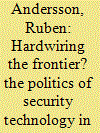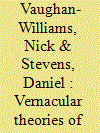|
|
|
Sort Order |
|
|
|
Items / Page
|
|
|
|
|
|
|
| Srl | Item |
| 1 |
ID:
143309


|
|
|
|
|
| Summary/Abstract |
Migration controls at the external EU borders have become a large field of political and financial investment in recent years – indeed, an ‘industry’ of sorts – yet conflicts between states and border agencies still mar attempts at cooperation. This article takes a close look at one way in which officials try to overcome such conflicts: through technology. In West Africa, the secure ‘Seahorse’ network hardwires border cooperation into a satellite system connecting African and European forces. In Spain’s North African enclaves of Ceuta and Melilla, advanced border fencing has joined up actors around a supposedly impenetrable divide. And on the EU level, the ‘European external border surveillance system’, or Eurosur, papers over power struggles between agencies and states through ‘decentralized’ information-sharing – even as the system’s physical features (nodes, coordination centres, interfaces) deepen competition between them. The article shows how such technologies, rather than ‘halting migration’, have above all acted as catalysts for new social relations among disparate sectors, creating areas for collaboration and competition, compliance and conflict. With these dynamics in mind, the conclusion sketches an ‘ecological’ perspective on the materialities of border control – infrastructure, interfaces, vehicles – while calling for more research on their contradictory and often counterproductive consequences.
|
|
|
|
|
|
|
|
|
|
|
|
|
|
|
|
| 2 |
ID:
143311


|
|
|
|
|
| Summary/Abstract |
As military technologies progress at a pace that challenges human cognitive and reasoning capacities, it is becoming ever more difficult to appraise the ethics of their use. In this article, I argue that the contours of ethical killing are shaped and constrained by a medical discourse that has its basis in a deeper regime of techno-biopolitical expertise. Narratives and representations of drones as surgical, ethical and wise instruments for counter-terrorism activities rely not only on the rendering neutral of both technology and practice, but also on a conflation of technology with practice as a biopolitical necessity. In this conflation, I argue, the practice of targeted killing is adiaphorized. Images and metaphors of the body politic turn drone-strikes into a form of medicine that experts prescribe as a means of treating or preventing political cancers, diseases and illnesses. Ethics, in turn, is treated as a primarily technical matter – something to be technologically clarified and administered from an expert space beyond the zone of ethical contestation. As long as this is the case, ethics will remain but a cog in our new killing machines.
|
|
|
|
|
|
|
|
|
|
|
|
|
|
|
|
| 3 |
ID:
143308


|
|
|
|
|
| Summary/Abstract |
This article considers how, in the light of contemporary military transformations, feminist theorizing about women’s military participation might be developed to take account of an emergent reality: the inclusion of increasing numbers of women in a range of roles within armed forces. A brief overview of established debates within feminist scholarship on women’s military participation is provided, and we explore the trajectory of feminist strategies for change within both militaries and other institutions. The promise and limitations of mainstreaming gender into security institutions, as a consequence of UN Security Council Resolution 1325, are discussed. The article argues that existing feminist critiques often remain deterministic and have too readily dismissed the possibilities for change created by women’s military participation, given the context of military transformations. Drawing on the idea of the regendered military, the article presents a conceptual strategy for considering how feminist theorizing about the gender–military nexus can take seriously women’s military participation while remaining alert to feminist political goals of gender equality, peace and justice.
|
|
|
|
|
|
|
|
|
|
|
|
|
|
|
|
| 4 |
ID:
143312


|
|
|
|
|
| Summary/Abstract |
Security implications of climate change have been highlighted by various political and advisory bodies, as well as non-governmental organizations (NGOs), in recent years. It is unclear, however, whether such a ‘securitization’ of climate change can also be found beyond institutionalized politics in the public realm, and beyond Western countries. This article addresses these questions by investigating mass media coverage in nine countries over a period of 15 years. Based on an analysis of more than 101,000 newspaper articles, it shows an increasing discussion of climate change in security terms, with diverging trends in the analysed countries. While Western, industrialized countries such as the USA, the UK or Australia display an increasing securitization of climate change, the amount of securitizing language has decreased in India and South Africa. Moreover, different countries refer to different security dimensions – with regard both to the subjects whose security is of concern (national security, human security) and to the type of resources that are discussed in security terms (energy security, water security, food security). While Western countries strongly focus on national security and energy security, emerging economies place greater emphasis on food and, less pronounced, on water security.
|
|
|
|
|
|
|
|
|
|
|
|
|
|
|
|
| 5 |
ID:
143310


|
|
|
|
|
| Summary/Abstract |
Citizens increasingly occupy a central role in the policy rhetoric of British National Security Strategies, and yet the technocratic methods by which risks and threats are assessed and prioritized do not consider the views and experiences of diverse publics. Equally, security studies in both ‘traditional’ and ‘critical’ guises has privileged analysis of elites over the political subject of threat and (in)security. Contributing to the recent ‘vernacular’ and ‘everyday’ turns, this article draws on extensive critical focus-group research carried out in 2012 across six British cities in order to investigate (1) which issues citizens find threatening and how they know, construct and narrate ‘security threats’, and (2) the extent to which citizens are aware of, engage with and/or refuse government efforts to foster vigilance and suspicion in public spaces. Instead of making generalizations about what particular ‘types’ of citizens think, however, we develop a ‘disruptive’ approach inspired by the work of Jacques Rancière. While many of the views, anecdotes and stories reproduce the police order, in Rancière’s terms, it is also possible to identify political discourses that disrupt dominant understandings of threat and (in)security, repoliticize the grounds on which national security agendas are authorized, and reveal actually existing alternatives to cultures of suspicion and unease.
|
|
|
|
|
|
|
|
|
|
|
|
|
|
|
|
|
|
|
|
|